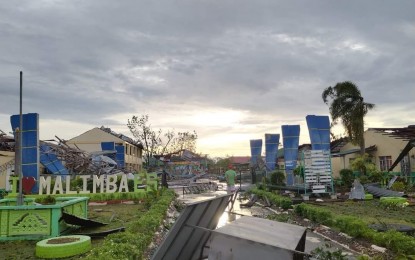
TYPHOON-DAMAGED SCHOOL. An elementary school in Barangay Malimba, Gapan City, Nueva Ecija is among the learning institutions badly damaged by Super Typhoon Karding. The Department of Education-Central Luzon (DepEd 3) said it is continuously conducting quick responses to schools hit by the typhoon. (Contributed Photo)
CITY OF SAN FERNANDO, Pampanga – The Department of Education-Central Luzon (DepEd 3) is continuously conducting quick responses to schools hit by Super Typhoon Karding in the region.
Albert Mantulac, regional disaster risk reduction and management (RDRRM) coordinator, said on Monday their agency is still assessing the damage caused by “Karding” to the schools.
Based on the DepEd’s rapid assessment of damages report (RADaR), there are 278 classrooms in the different schools in the region that were totally damaged, 266 classrooms with major damage, and 637 classrooms with minor damage.
Mantulac said most of the damaged schools are those in the provinces of Aurora and Nueva Ecija.
Meanwhile, he said schools in Bulacan and Pampanga were flooded.
“Patuloy po ang ating school DRRM coordinators sa ating quick response actions para maisaayos ang ating mga paaralan (Our school DRRM coordinators are continuously conducting quick response actions to fix our schools),” he said in a news report.
Mantulac said there are 221 schools in the region that have been used as evacuation centers.
DepEd 3 has assured that some typhoon-hit schools are conducting blended learning as part of the agency’s learning continuity program during disasters or emergencies.
Dr. Nestor Nuesca, DepEd 3 education program supervisor, said printed or digital self-learning modules, radio or television-based instructions, and online distance learning can be used during emergencies.
“This has been proven to support distance-teaching and learning and should be used if ever it is possible and available,” Nuesca said. (PNA)
